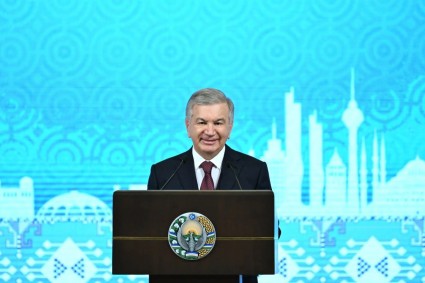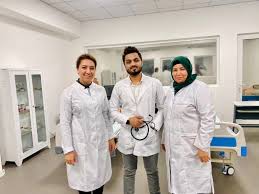On May 11 the UN High Commissioner for Human Rights Zeid Ra’ad Al Hussein took part at a press conference during his mission to Uzbekistan.
"This has been the first ever visit to Uzbekistan by any of the six UN High Commissioners for Human Rights, since the Office of the High Commissioner was established in 1993, just two years after Uzbekistan became independent, and one year after it became a member of the United Nations.
It has been a very brief visit indeed — effectively one full, highly intense, day of meetings yesterday, and a few hours in Samarkand today. That was shorter than either my Office or the Government of Uzbekistan intended, as we both viewed this visit as very important, very significant. But in the end, because of conflicting schedules, one full day of meetings was all we could manage without postponing the visit until the autumn — which neither of us wished to do.
I am very glad we did not postpone it. We packed a great deal of discussion into a single day yesterday, culminating in a 90-minute meeting between myself and President Shavkat Mirziyoyev, in which we found much common ground and reached agreements on a number of concrete steps.
My predecessors visited the four other Central Asian Republics on a number of occasions, but none of us was able to visit this country. When we set up our Regional Office in Bishkek in 2008, Uzbekistan made it clear that the office covered four countries, not five. After my meeting with the President yesterday, we have a clear agreement that our Regional Office will from now on work closely with all five Central Asian Republics, and our Regional Representative, Ryszard Komenda, is here with us today. That is one important result of this visit, which should enable the Office of the UN High Commissioner for Human Rights, and the wider UN human rights system, to deepen cooperation during what appears to be a key moment in Uzbekistan’s history, with the Government embarking on an ambitious and — on first sight at least — very dynamic programme of reform.
I should note at this point that this visit and its outcomes have not come out of the blue. There has been gradual progress on human rights in Uzbekistan over the past four years, with much credit due to the Resident Coordinator and the UN Country Team here who, in the absence of any permanent presence of my Office, have made the advancement of human rights a priority, and have cooperated with many Government departments on human-rights related issues leading to a National Development Plan being adopted in November 2014, and a continuous human rights dialogue and succession of activities between the UN and the Government since then. And it is heartening to see that their efforts are also clearly appreciated by the Government, with the acceptance by all concerned that peace, security and development will not be durable without a strong grounding in human rights.
On the back of such a short visit I am not going to attempt a full overview of all human right issues in Uzbekistan. I note however that there was a consistent recognition in all my meetings with senior government officials and members of the judiciary that the country has — to put it in the words of one Minister — “issues and challenges.”
There was also a statement of intent, repeated on a number of occasions, that the response to those issues and challenges needs to be rooted in international human rights laws and standards, and that there is some way to go in this regard. The Speaker of the Parliament Legislative Chamber, for example, stressed this point and said that every new law is now going through a process to see if it is compliant with international human rights standards.
This clear-eyed acceptance that there are problems, and there are also well-honed solutions to those problems available within the framework of international law and the institutions designed to uphold them, is key. This means we can really get down to business.
Over the past eight months or so, the Government of Uzbekistan has initiated a dizzying array of new laws, policies and plans with human rights ramifications. According to the Minister of Justice, whom I met alongside the Minister of Interior and Prosecutor-General yesterday afternoon, the Government has a target of adopting 125 regulatory documents in 2017 alone — and a number of other key laws and regulations were already being drawn up, discussed and adopted during the last few months of 2016. Again, I will not attempt to analyse, or even summarise, these during this short statement. In general, the aims appear to be substantive, constructive and important.
Human rights — all categories of human rights — figure very prominently across the five sets of priorities laid out in the over-arching policy document guiding these proposed reforms — the President’s 2017-21 Development Strategy. Anyone wishing to understand what underlies the changes starting to take place in Uzbekistan — and what lies behind my visit — should look closely at the Development Strategy.
The Development Strategy provides an impressive framework for the numerous reforms demanded by the President and planned by the Government. I encourage the Government to monitor actual human rights results as part of the High Level Government monitoring of the implementation of the Development Strategy. Needless to say, frameworks and plans are one thing, and results are another — especially when it comes to human rights, when States often make fine promises but fail to back them up with real change. Nevertheless, I believe the intent is evidently genuine — and while there is some scepticism outside Uzbekistan that this may amount to window-dressing, I have not encountered such scepticism during my visit here.
I was particularly struck by yesterday’s meeting with members of civil society. Firstly, the attendance was high — some 60 people in all (twice as many people as we were expecting) from different segments of civil society, including some of those most critical of the authorities. Secondly, several participants expressed very forthright opinions, yet there seemed to be little or no anxiety about the presence of numerous TV cameras, including state television.
Although the meeting was short — much too short to hear everyone’s views — the enthusiasm was palpable. As one participant said: “This is the first time in 12 years that we have had a meeting like this.” I hope that we are indeed seeing a new dawn for civil society in Uzbekistan, and that from now on such open, forthright, well-attended meetings become the norm. If the President and his Government are to achieve their declared aims they will need a strong, vibrant and dynamic civil society — and media — helping them, but also pushing them, criticizing them and exposing failings, gaps and injustices.
To help it advance its efforts to live up to its treaty obligations, I am recommending — and the Government itself is proposing — closer cooperation with the other parts of the UN human rights system, including the Treaty Bodies and Special Procedures. After a gap of some 15 years, during which not a single Special Procedure has been invited to visit the country, I am delighted to hear the Government’s confirmation that cooperation will be resumed, starting with an invitation to the Special Rapporteur on the Freedom of Religion or Belief. Like civil society, they play a vital role in providing expert advice on positive reform and in pointing out gaps and failings.
In recent years the Government has proved that it can make major systematic efforts to eradicate an entrenched human rights violation — for example in the concerted and highly successful effort it made to end the age-old practice of large scale forced child labour during the annual cotton harvests. The Development Strategy implies similar efforts to eradicate other entrenched violations — including torture, harassment by security forces, and indeed the continued forced unpaid labour of adults during the cotton harvests.
I had another glimpse of change already under way this morning in the historic city of Samarkand, where I visited the ‘People’s Reception Office of the President’ for the Samarkand region. This was set up as part of the President’s initiative to listen to people all across the country and act on their complaints. And the complaints have been forthcoming — some 800,000 in all since the initiative began late last year. These have apparently fed into the numerous reform proposals, and are also being addressed on a practical level locally, as I saw in Samarkand, where referral desks are operating — and in some cases providing immediate assistance — on issues such as housing, employment, health, social care, banking and legal assistance. Mobile Reception Offices have also been set up to reach out to the more remote villages and rural areas.
While in Samarkand, I also met representatives of six different religious confessions and nine cultural centres, including several ethnic, national and linguistic minorities. With 138 such cultural centres across the country, their role in promoting inter-religious and inter-ethnic tolerance and harmony — and in ensuring the viability of many of the government’s proposed reforms — will be vital, and I strongly support the apparent intention to include them as much as possible and as transparently as possible in the reform process.
I would like to conclude by thanking the President and all the other senior officials I met during this short visit, and especially the Minister of Foreign Affairs, as well as the Director of the National Human Rights Centre, who was present at almost all the meetings, and the Parliamentary Ombudsman who will play an increasingly crucial role on oversight, as the reforms unfold. My visit has been extremely efficiently organized, and the hospitality extended to me and my delegation was exceptional and greatly appreciated.
Uzbekistan is, in my view, at a cross-roads. The volume of constructive human-rights related proposals, plans and new legislation that has emerged since President Mirziyoyev took up office is remarkable. The successful implementation of those reforms could have a transformational impact on the country’s future. I am extremely happy that I myself, my Office and my staff are now set to play an active role in trying to secure a future where every citizen and resident of Uzbekistan has their human rights observed, and state-sponsored violations become a distant memory. It is going to be a long and difficult road to get near that point, with obstructions and setbacks, but I do believe the journey has begun."














